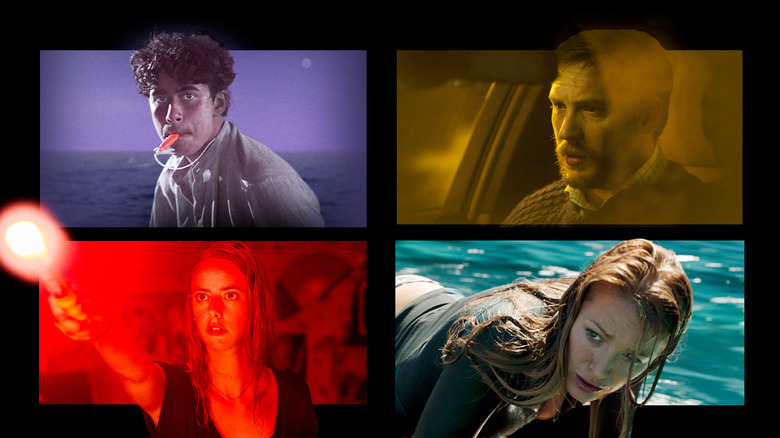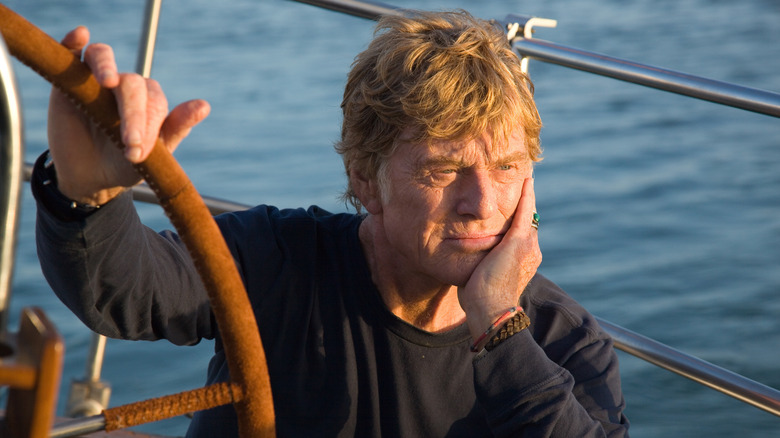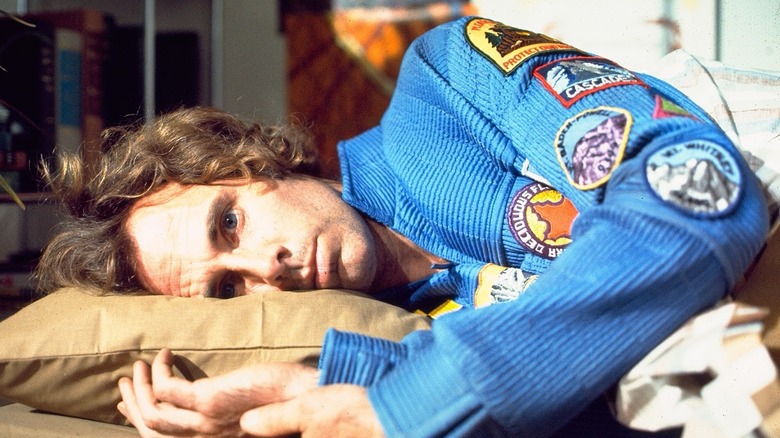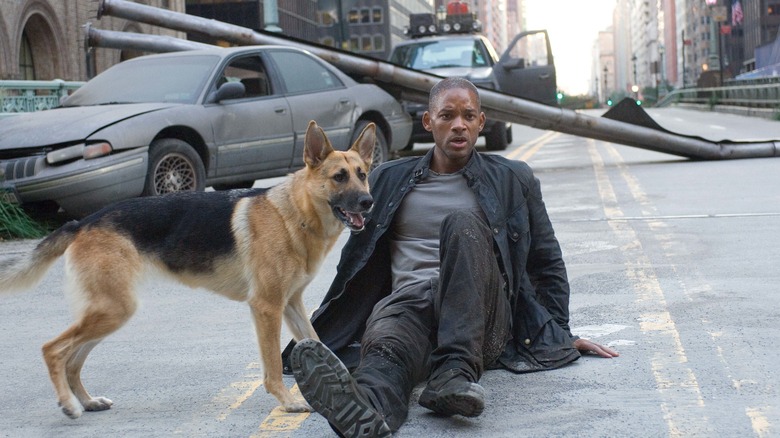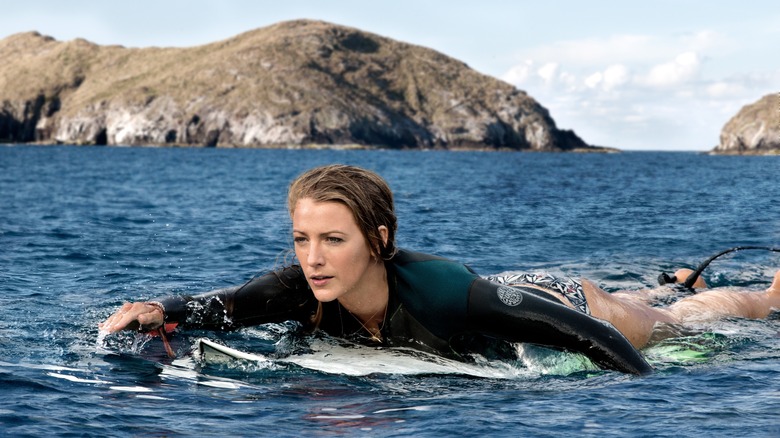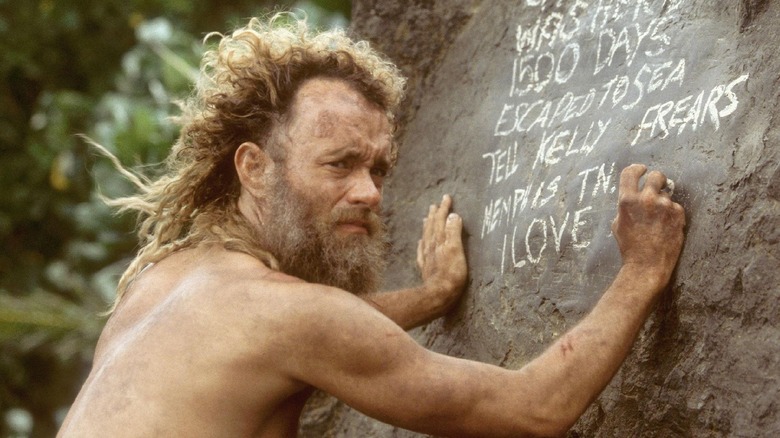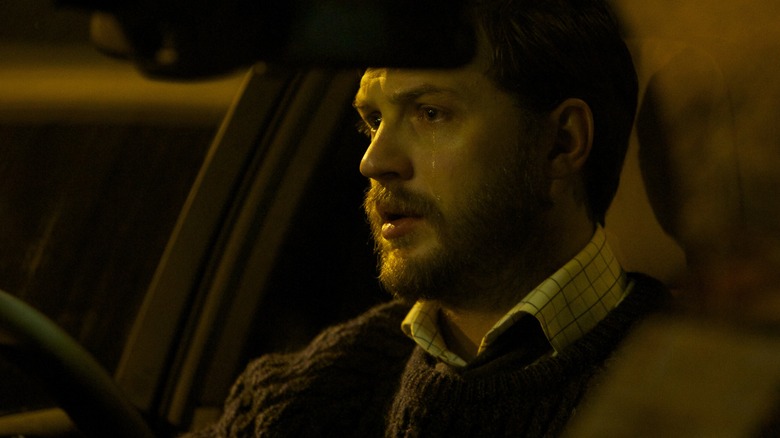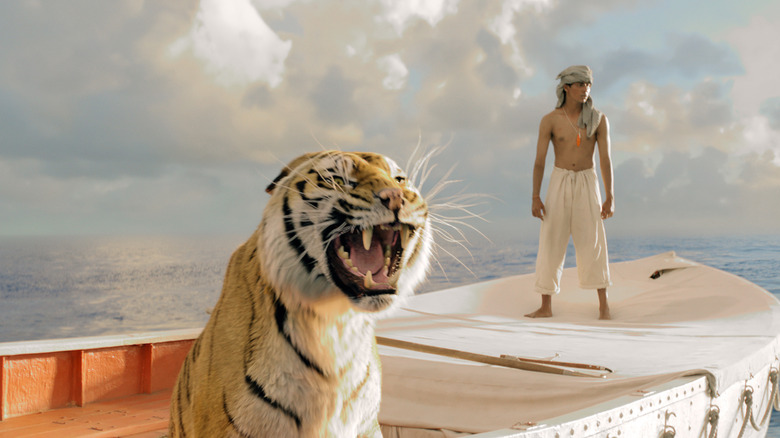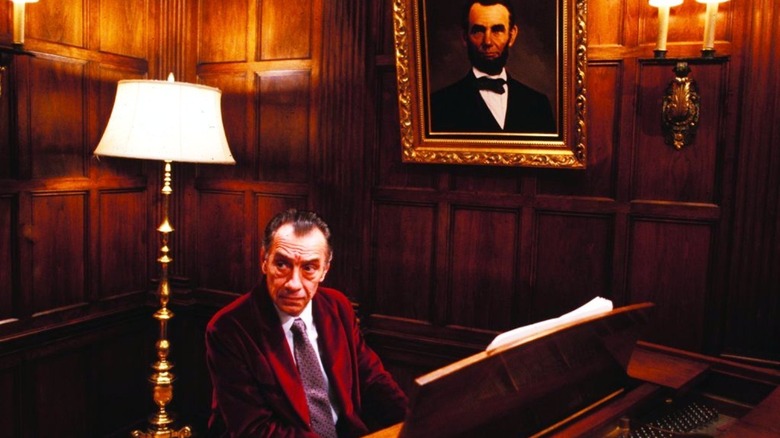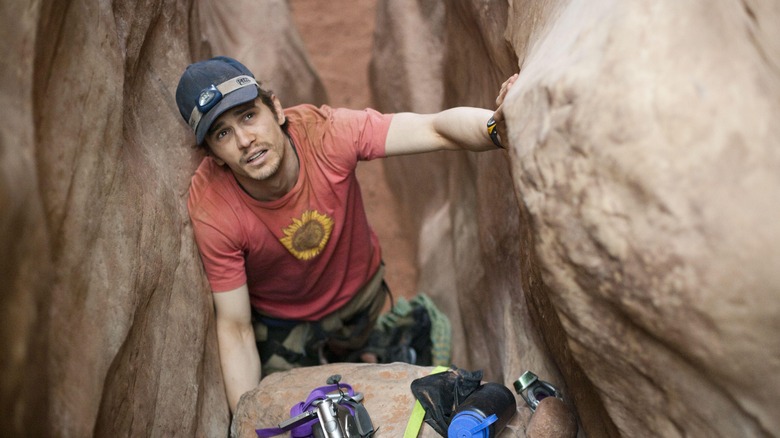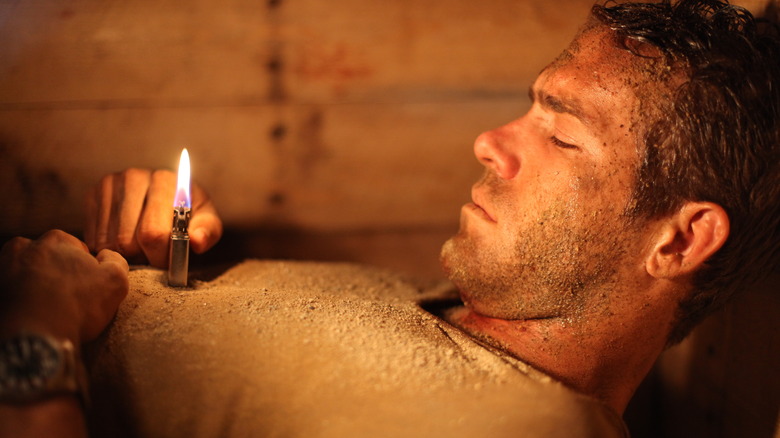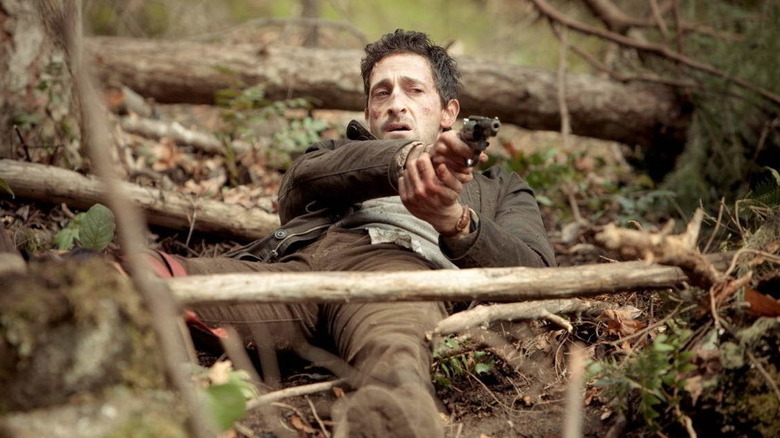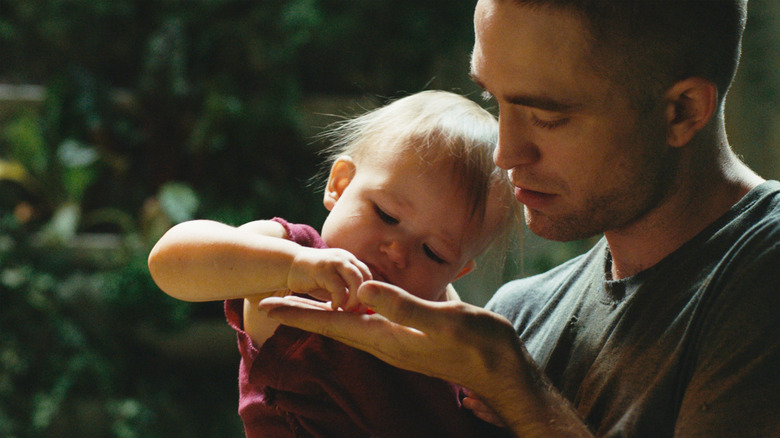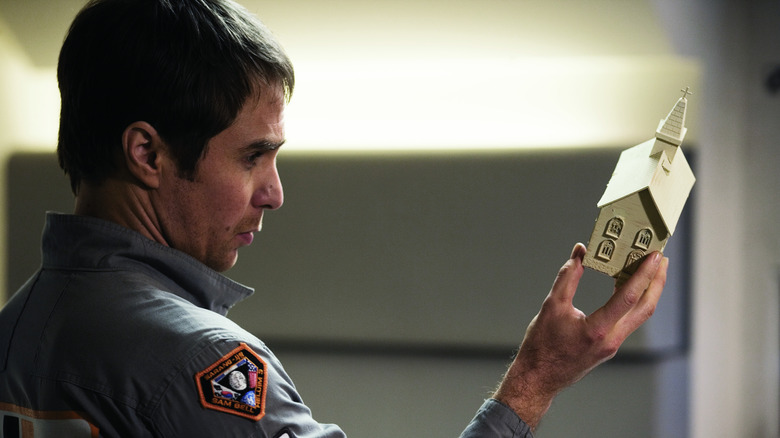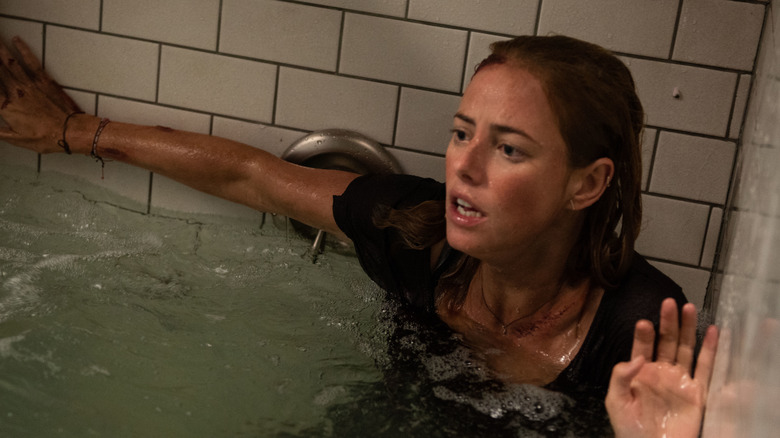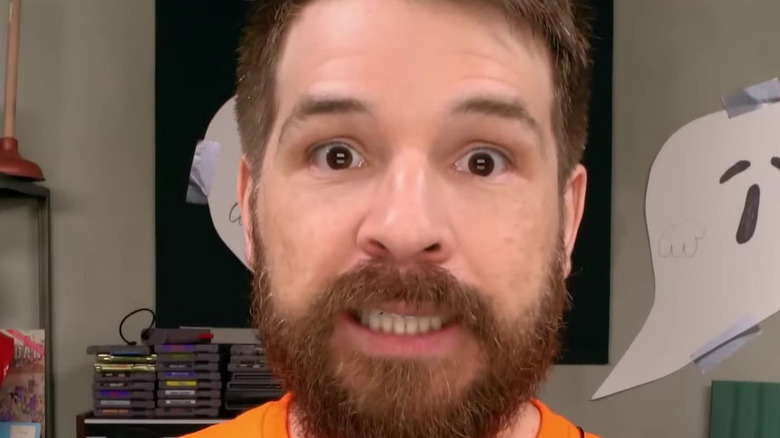15 Movies That Mostly Featured One Actor
Although it may make life a lot easier for the casting director, movies featuring mostly one actor are a tough sell — and let's be honest, a bit of a gamble. An ensemble cast featuring some big names and even bigger egos riffing off one another on the big screen is a joy to behold. Without difference there is no meaning and a devious and Machiavellian villain makes the bold and wholesome hero that little bit bolder and vice versa. Without the cut and thrust of tension-fueled dialogue, the sparks of friction between characters, and a diverse range of individuals for the audience to relate to a movie can fall flat on its face quicker than you can say, "it's a flop!"
Yet there are rare and distinguished exceptions where less is more and one complex and charismatic character played by an actor on top of their game can conspire to create movie-making miracles. When an actor gets the gig to carry the full weight of a film on their shoulders, they have to ensure they have the gravity of presence, pathos, and physicality to pull it off. The script has to be bulletproof and the director has to keep the momentum turbo-charged because there's no help at hand to make up the slack if things get a little tedious and turgid. Here are 15 of the best examples of actors upping the ante and single-handedly putting the drama in dramatic.
All Is Lost
Although they only made "The Sting" and "Butch Cassidy and The Sundance Kid' together, Robert Redford's on-screen partnership with Paul Newman had the sort of alchemy that made them one of Hollywood's most historic and legendary on-screen pairings. In J.C. Chandor's "All Is Lost," Redford has no older statesman of the craft to watch his back, but what he does have is a sinking boat, an indifferent and unforgiving ocean, and the dispiriting air of a man who's out of time and out of his environment. Redford plays a man with no name, and no history, who is alone and lost in the Indian Ocean after a rogue shipping container tore a hole in his boat. His solitude is defined and determined by a natural world that is careless of his plight and pitiless predicament.
Redford's character could be the last human being in the universe. Yet, in "All Is Lost," the sun still rises and sets, and the tides still ebb and flow in universal mockery of the conceit and folly of the individual. Redford's perpetual struggle for survival serves as a poignant reminder of humanity's increasing alienation from the natural world and the self-destruction of modernity. With no supporting cast and no dialogue except for a brief voice-over at the film's beginning, Redford does a phenomenal job of holding the screen for the duration. His every grimace, grunt, and weary lament is positively Shakespearean. Redford was 77 at the time of filming, and his physicality and commitment are admirable. He leaves it all on the screen and reminds the viewer of what an actor on top of their game is capable of.
Silent Running
"Silent Running" was an environmentally aware film before most people realized the Earth's temperature was rising and things were heating up in a big way. Directed by Douglas Trumbull, the 1972 sci-fi movie paints a bleak vision of a future when the Earth has been ruined and all plant life has been decimated. To turn the tide and bring back a wave of green, astronaut and botanist Freeman Lowell, played by Bruce Dern, is part of a small crew charged with caring for a host of varied plant and animal life in one of six huge greenhouse domes attached to spaceships. The plan is to use the plant specimens to reforest Earth and show mother nature how much she's been missed. Yet, things don't exactly go to plan!
Big business steps in and orders the crews pulling the domes to blow them up so the ships can be used for more profitable projects. Five of the domes are eventually destroyed, but like a natural-born eco-warrior, Lowell steps in and fights to save his favorite dome, killing fellow crew members in the process. Alone in space, except for some rare vegetation and two drones named Dewey and Huey, Lowell fights to preserve the promise of life in the cold and dark emptiness. Like Noah for the Baby Boomer generation, Dern does a grand job of keeping the audience engaged and caring about the plight of a character who is both moralistic and unhinged. Interestingly, Trumbull told Den of Geek that originally the film, "Didn't have an environmental theme at all. It was about alien contact. It transformed during the production."
I Am Legend
Imagine being one of the few survivors of an apocalyptic virus that has wiped out 99% of people on the planet and turned most of those remaining into a bunch of mutant albino cannibals called the Darkseekers. That's the predicament that U.S. Army virologist Robert Neville (Will Smith) faces in Francis Lawrence's "I Am Legend," based on Richard Matheson's 1954 novel. Yet Neville is not just content with strutting around the place like an urban Van Hesling with a shotgun; he's a medical man with natural immunity to the virus and as such wants to use his blood to treat the afflicted. He spends his days wisely, making continuous radio broadcasts for fellow survivors and carrying out experiments on rodents. Before buddying up with a woman and young boy, Neville is an achingly solitary figure, wandering the wreckage of New York City, scavenging for supplies, with his faithful canine companion, a German Shepherd named Sam.
The scene where Neville is forced to put down his dog after she becomes infected by the virus and begins to turn is heartbreaking and hammers home the complete isolation of Neville's predicament. Smith gives a career-defining performance as Neville and surprised many of his critics with a role that wasn't just an amplified projection of his own wisecracking persona, but a nuanced and emotionally credible portrayal of a man on the edge and at the end of the world as we know it. Smith told The Hollywood Reporter, "I'm obsessed with trying to put small character dramas into the middle of blockbuster packages. 'I Am Legend' easily could've been a stage play, right? You know, a one-man show, a dude with a dog, but to date, that's my biggest opening and second-biggest film."
The Shallows
Sharks often get a raw deal in the movies. They're nearly always portrayed as merciless murderers with bloodlust that must be satisfied at any cost. They're relentless in pursuit of their prey and calculating and devious in all the ways they can kill it. The shark in "The Shallows" doesn't deviate from type and spends a thrilling 86 minutes trying to eat surfer girl Nancy, played with gusto and grit by Blake Lively, after she accidentally winds up in its whale carcass feeding zone. Pitting a friendly human who just wants to catch some waves during a cathartic vacation against a pure predator who kills and feeds without qualm or conscience is always going to entertaining, and "The Shallows" doesn't disappoint.
After seeking out the surf on an isolated beach in Mexico, Nancy is knocked off her surfboard by her toothy nemesis. She is bitten badly on the leg and forced to seek sanctuary on a remote rock in the ocean. Delighted at the chance to play a game of cat and mouse with its human toy, the shark is happy to swim in circles, hide, and wait for Adams to leave the rock or for the tide to swallow it. In the meantime, bit players come and go and are all routinely dispatched in inventive ways by the killer of the deep who only really has eyes for Nancy. Yet, Nancy has other ideas and war is declared on the murderous maneater. Tasked with the lion's share of the acting, Lively's adrenalized and athletic performance never lets up, and it would be a strange fish indeed who didn't root for her to ultimately show the shark who's really boss.
Cast Away
No matter how blue the water, white the sands, or hot the sun, being stranded alone on a desert island would be lonely, and depressing, but above all, extremely tedious. Day after day spent in your own company, without so much as a book or Netflix subscription to alleviate the monotony would drive the most resilient mind to despair and doomed attempts to brew their own brand of moonshine. Why, you might even give a washed-up volleyball with a face, a personality, and a name, and start confiding your deepest thoughts and feelings in them. That's exactly what happens to Tom Hanks' character Chuck Noland in Robert Zemeckis' "Cast Away." The tale of a FedEx employee who winds up in a tropical but extremely isolated paradise in the South Pacific is an engaging study of what can happen to an individual who is suddenly cut off from everything and everyone he knows.
Chuck's slight decline from a hearty optimist to a weary wreck whose best friend is a volleyball called Wilson is a rollercoaster, and Hanks is the caliber of actor who is more than a match for both the physical and mental transformation it entails. Hanks' performance is both restrained and persuasive, even when he's chatting amicably with his volleyball friend. He has an empathetic presence that makes the audience suffer every sling and arrow of outrageous fortune that is thrown Chuck's way. Tom Hanks told Good Morning America's Diane Sawyer, that Chuck's true battle is not "against the elements, it's about desperation. It's about a different brand of loneliness that is very different from being home on a Saturday night with nothing to do."
Locke
The U.K.'s motorways are a sterile and soulless network of roads at the best of times, but late at night when you're in a car on your own, the encroaching darkness, the endless march of headlights, and the hypnotic hum of the engine can conspire to make an individual feel lost in a limbo between worlds. It may not sound like the perfect setting for a film, but in Stephen Knight's "Locke," the man who created "Peaky Blinders" defies expectations to deliver a unique drama that goes for the jugular. Set entirely in the interior of a car, driven by the titular Ivan Locke (Tom Hardy), the film relies solely on Hardy's skill as one of the best actors of his generation to drag the audience along with him on a trip into a moral minefield where doing the right thing can lead to terrible consequences.
Locke was a man abandoned by his father at birth and determined not to let history repeat itself, he drives to be by the side of a woman he had a one-night stand with as she gives birth to his child — even if it means losing his wife, family, job, and reputation. As the road becomes a metaphor for the decisions that define us on life's journey, Locke is constantly on the phone with his wife, sons, work assistant, boss, and the pregnant woman he hardly knows as he attempts to juggle commitments and salvage some hope from a dire situation. Hardy's patchy Welsh accent is the only weak point in a performance that keeps the audience gripped and on the edge of their seat for the duration.
Life of Pi
Movies about the survivors of shipwrecks are not exactly rare, but then one comes along which features a 16-year-old boy and an angry Bengal tiger called Richard Parker and blows everybody's minds. Based on Yann Martel's book of the same name, director Ang Lee's "Life of Pi" tells the story of the time a young Pi was traveling to Canada on a ship with his family and the motley collection of animals from their zoo. The plan is to sell the animals and begin a new life, but a storm hits and sinks the ship, drowning everyone except Pi, Parker, a hyena, a zebra, and an orangutan. The other animals soon meet grisly ends, leaving the boy and tiger unlikely comrades on a lifeboat floating aimlessly in the middle of the ocean. It's an engaging and exciting premise and an even better movie.
Visually, "Life of Pi" offers the viewer bags brimming with sublime eye candy, and as a story, it has enough twists and turns to keep you on the edge of your seat, but it also throws up some interesting philosophical questions. In theory, Pi is not alone because he is sharing his adventures with a tiger, and although they learn to peacefully co-exist, the alien otherness and terrible majesty of the tiger in many instances add to his solitude. Parker is an all-silent and all-knowing creature who has one foot in this world and the next, and his very presence hammers home the William Blake quote, "What immortal hand or eye dare frame they fearful symmetry." Suraj Sharma plays Pi with both a wide-eyed earnestness and world-weary melancholy that are perfect for the role and the tale of how all life shares similarities but also myriad differences.
Secret Honor
Before Oliver Stone's 1995 movie "Nixon" attempted to penetrate the flawed and complex character of former U.S. President Richard Nixon and find the human being beneath the caricature, there was Robert Altman's 1984 movie "Secret Honor." Set in the late 1970s, the film features Philip Baker Hall doing a spectacular take of the disgraced former U.S. president as he paces the study in his New Jersey mansion reflecting on his political career and fall from grace. Carrying a bottle of liquor, a gun, and a tape recorder, Nixon's mouth can barely keep up with his thoughts as he gives a riveting monologue on the people, events, and circumstances that helped shape his life. Nixon discusses everyone from Dwight Eisenhower to J.F.K. in a rage-fuelled tirade. When thoughts turn inwards and he begins to reflect upon himself, he does so with a great deal of self-pity and refusal to own his mistakes.
The combination of Donald Freed's brilliant script, Altman's direction, and Hall's performance knock all the balls out of all the parks. Hall not only physically resembles Nixon to an uncanny degree, but he wears his paranoid, twitchy, and slightly sinister persona like a well-worn jacket. You almost expect him to leave a trail of slime as he oozes around the place like something repellant and insect-like. Yet there are moments of illuminating humanity in Hall's performance as he exposes Nixon's huge self-esteem issues in his perpetual rants about being a victim. Perhaps the film's biggest strength is it engenders in the audience a degree of sympathy for this political devil.
127 Hours
Falling into Utah's Bluejohn Canyon and having your arm trapped against a wall by a huge boulder is no way to spend five and a half days, but that's the premise of Danny Boyle's survival movie "127 Hours." Based on the true story of real-life daredevil canyoneer Aron Ralston, the film is a study of what could happen if you underestimate the great outdoors and neglect to tell your nearest and dearest you're planning to spend a few days alone in the wilderness. In an age before universal mobile phone coverage was a thing, Ralston, played with hearty enthusiasm by James Franco, begins the film as a happy-go-lucky adventurer who enjoys riding his mountain bike around the desert, making video diaries, and showing fellow hikers around secret underground pools.
Life's a series of spectacular sunsets and vistas for Ralston until a big boulder puts an end to the party. Here's where things get interesting: Alone, desperate, terrified, and stranded in the canyon with no hope of rescue, Ralston has to dig deep and find what he's really made of to survive the ordeal. He hallucinates, resorts to desperate measures, such as drinking his urine, questions his sanity, and films some heartbreaking video diaries for his mom and dad. Interestingly, Ralston also has a glimpse of the future and this hardens his resolve to survive, which, without wishing to spoil the film, leads him to some pretty dark places. Franco shines in the lead role as he conveys a range of emotions from blind euphoria to detached fatalism. Yet, it's the fierce and unconquerable will of the human spirit to endure, survive, and live to fight another day that he personifies best.
Buried
Being buried alive has long been the stuff of nightmares, but when it's the stuff of a film featuring Ryan Reynolds and a plot involving terrorists and kidnapping, then the bad just got a whole lot worse. Directed by Rodrigo Cortés, "Buried" features Reynolds playing Iraq-based American truck diver Paul Conroy who wakes up one day to find himself underground in a wooden coffin. He's alone, and in largely a one-man show that could have been a problem in terms of driving the plot forward. Fortunately, Conroy has been buried with a lighter, a pen, and a Blackberry phone, which he uses to ring the authorities and his employer. Yet, none of them are able to send in the cavalry. Things get even bleaker when a guy calls Jabir calls and tells Conroy that he's been kidnapped, and unless he coughs up $5 million, the coffin will also become his grave.
"Buried" is a tense, edge-of-your-seat, and claustrophobic thriller. Reynolds's character battles not only time, but bureaucracy, snakes, the evil of others, and the fading of all hope as his predicament grows increasingly desperate. The agony of being buried alive is rendered all that more excruciating because Conroy has been given a glimmer of hope and a line of communication with the world of the living. There are particularly poignant scenes where Conroy talks to his wife to reassure her everything will turn out fine, and one where he calls his dementia-stricken mother who can barely remember her son let alone comprehend his situation. Things get progressively worse for Conroy as the kidnappers up the ante in a film where Reynolds' performance drags the viewer in by the scruff of the neck and doesn't let them go to the final frame.
Wrecked
Director Michael Greenspan's "Wrecked" often has a dreamlike and confused quality, and what it lacks in suspense compensates for in Adrien Brody's performance as a man suffering from amnesia. Denied a name or identity for the film's entirety, we are introduced to Brody's character as he wakes up in a smashed-up car in a ravine. The vehicle has been involved in a severe crash and the only things Brody's character knows for sure is that his leg is both stuck and broken, and the other two occupants of the car are dead. He also finds a revolver in the car, sacks of cash in the boot, and a credit card belonging to one Raymond Plazzy beneath the passenger seat. A news broadcast on the radio reveals that a man called Plazzy has just carried out an armed robbery, and Brody's character assumes that it's him. As we find out, he couldn't be more wrong.
As the film progresses, and Brody's character manages to free himself from the car, he attempts to leave the wilderness in search of civilization, and as he does so, he eventually pieces together little jigsaw pieces of exactly what happened until the big picture reveals itself in stunning clarity. "Wrecked" is very much a one-man act, but Brody is more than capable of carrying the can. He brings a haunted air and melancholy confusion to a character who has lost everything and isn't even sure what they are searching for but remains determined to find it at any cost.
High Life
When the worlds of science fiction and horror collide, the audience expects something pretty spectacular, and Claire Denis' "High Life" is bang on the buck. The narrative of "High Life" is told through flashbacks and begins with Monte (Robert Pattinson) raising a young girl named Willow (Scarlett Lindsey) as the two travel through the cosmos on a vast spaceship together. Immediately, the audience is wondering why they are alone and what has happened. When little clues are finally dropped, a horrific tale unfolds of a group of convicts who were given a reprieve from their life sentences on condition they participate in an unusual mission. It involves them being used like a bunch of space guinea pigs and sent into the heart of a black hole in the hope of capturing the unique energy found there.
As they near the event horizon, the former convicts continue to viciously turn on one another like a sort of "Lord of the Flies" in space — in part aggravated by the sadistic Dr. Dibs, who's obsessed with experimenting on them in a bid to create a new generation that can carry on the mission after they have passed. After forcibly harvesting Monte's sperm, Willow is born, but because the rest of the crew have either died or fallen victim to disease, he's left with the sole responsibility of caring for the child. Pattison enjoys the majority of screen time and captures perfectly the dilemma of a man who knows both he and his child face the end of everything. Yet, he remains determined and steadfast to keep a brave face on and give Willow the best life he can before the black hole which overshadows the film swallows them both.
Moon
Spending three long years alone on the far side of the moon doing the same job day in and day out is enough to test the patience of a saint. Imagine if, on top of that, your only companion is an AI who goes by the name Gerty. You'd no doubt be in quite the rush to end your solitary stint in space as a glorified miner of an alternative fuel called helium-3 and get on the first shuttle home. This is the back story of Sam Bell (Sam Rockwell) in Duncan Jones' debut film "Moon," but in comparison with what lies in wait for the poor put-on astronaut, it's a walk in the park.
An accident at work sees Sam wake up in the moon base's hospital, suspecting something suspicious is afoot. Events unfold, and Sam finds he has a doppelganger on the moon also called Sam. The two Sams begin to suspect one of them is a clone. As it turns out, both of them are part of a long line of clones from the original Sam Bell that the company they work for has been using for cheap and unethical labor. As they realize their memories have been implanted and they have never experienced life outside of the moon, their grief is tangible. Playing not just one but two Sams, Rockwell is in fine form as the man who realizes he's not real but a replica. It's heady stuff and in an age where the line between technology and humanity is becoming increasingly blurred asks some difficult questions.
Crawl
As an apex predator, an American alligator is something you don't want on your tail. They're unrelenting in pursuit and prehistoric in their capacity for causing untold carnage. In Alexandre Aja's "Crawl," Haley Keller (Kaya Scodelario) attempts to rescue her unconscious father from the crawl space of her family home in Florida during a hurricane and finds all escape routes blocked off by not one but several patient alligators in their prime. As these giant, cold-blooded creatures roam around the place majestically in search of nibbles, Keller attempts to evade being eaten and getting herself, her father, and the family dog, Sugar, out of Dodge. It's no easy task, and along the way, there are plenty of spills, thrills, and scenes of other unfortunate souls falling foul of the alligators.
"Crawl" is very much Scodelario's movie, and she's impressive as a no-nonsense all-action heroine who takes no lip or fang. This is one woman who is not going to let her dear old dad or dog end their days in the maw of a reptile. "Crawl" has just enough suspense and action to keep you gripped. It's an economic creature feature that never outstays its welcome. Haley is pretty much on her own against the army of alligators but proves she's more than a match for the reptilian mind.
Deadstream
In the comedy horror "Deadstream," husband and wife directing team Vanessa and Joseph Winter tackle the timely subject of just how low a YouTube personality will go to salvage their popularity and get their views back on track. As well as co-directing, Joseph Winter composes the soundtrack and stars in "Deadstream" as disgraced content creator Shawn Ruddy, who is facing a backlash after one of his controversial stunts go wrong. To win back his sponsors and a large part of his fanbase, he hits upon the idea of live streaming himself spending a night in America's notorious haunted house that has claimed the lives of many. Believing his content-creating days are far from done, Ruddy packs his camera and heads to Death Manor.
What happens next is an enthralling, entertaining, and well-crafted horror comedy from the Winters. Joseph is genuinely funny as Ruddy and captures the mock sincerity, blind enthusiasm, crass opportunism, uncontrollable ego, and craven desire for validation of many a YouTube personality. Such a personality is ripe for ridicule and placing in an environment they cannot control or understand. The Winters have a ball making Ruddy jump through hoop after hoop as, even in the face of the supernatural and the unfathomable, he never gives up on his faith in the all-conquering majesty and might of social media.
